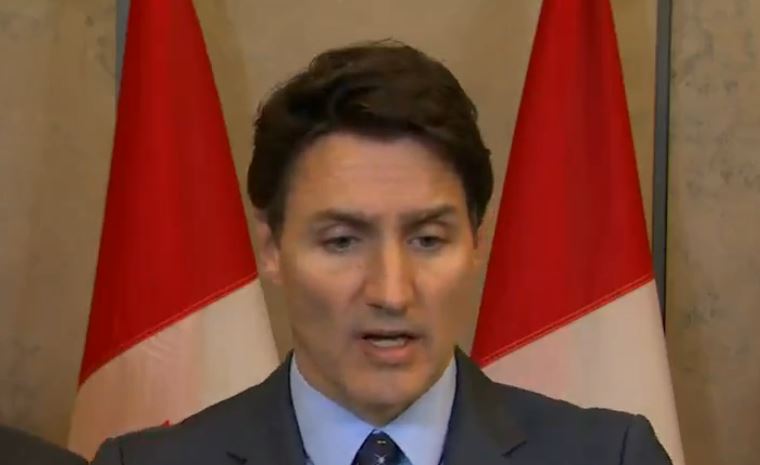Canadian Prime Minister Justin Trudeau is facing growing unrest within his own Liberal Party, as some members of his caucus have reportedly begun quietly pushing for his resignation. While the lawmakers behind the movement have tried to keep their discontent from going public, Immigration Minister Marc Miller recently characterized their efforts as “the most passive-aggressive” attempt to unseat Trudeau. As rumors swirl about the prime minister’s future, Trudeau is now tasked with managing internal divisions while continuing to lead Canada through a challenging period.
Not all members of the 153-member Liberal caucus have seen the paperwork, but few are surprised. Many are eager to hear Trudeau and Telford discuss their plans for securing a fourth term after nearly nine years in office.
On the other hand, MP for Carleton and the Conservative Party of Canada leader started to be critical of Trudeau’s policies on social media.
Canada isn't the country we remember anymore after 9 years of Trudeau.
Doubling housing costs & bringing crime, chaos, drugs & disorder to our streets.
Not. Worth. The. Cost: https://t.co/oshR2VRQPr pic.twitter.com/yJ2oYaZqX5
— Pierre Poilievre (@PierrePoilievre) October 17, 2024
The Quiet Revolt
The reported dissent comes from a faction of Liberal lawmakers who are concerned about the party’s declining popularity and believe that Trudeau’s leadership may be part of the problem. However, those advocating for his departure have opted for a discreet approach, avoiding any public statements that could cause embarrassment or deepen internal rifts within the party. This passive-aggressive approach, as Miller described it, suggests that while dissatisfaction exists, the dissenters are wary of triggering a full-blown crisis ahead of the next election.
Miller’s comments on the situation provide a rare glimpse into the tensions brewing within the party. While he didn’t name any individuals, his remarks confirm that the push to remove Trudeau is real, even if it hasn’t reached a public crescendo. The question now is whether Trudeau can quell the growing unrest or if these quiet calls for his resignation will gain momentum in the coming months.
Trudeau’s Leadership Challenges

Justin Trudeau, who has served as prime minister since 2015, has faced numerous challenges during his time in office. Early in his tenure, he was seen as a fresh, progressive leader who could bring change to Canada. His government’s policies on issues such as gender equality, climate change, and Indigenous rights initially garnered widespread support.
However, Trudeau’s later years in office have been marked by controversies and growing dissatisfaction. Scandals such as the SNC-Lavalin affair and the WE Charity debacle dented his image as a transparent and ethical leader. Additionally, his handling of the COVID-19 pandemic, rising inflation, and affordability issues, particularly in housing, have left some Canadians frustrated with his government’s approach to solving pressing economic problems.
One of the most recent points of contention has been Canada’s immigration policy. While Trudeau has supported high levels of immigration, a growing number of Canadians are concerned about the strain it’s placing on the country’s infrastructure, including housing and healthcare systems. This issue has sparked debate not only among the public but also within the Liberal Party itself, as some members argue that the government’s current approach is unsustainable.
Trudeau’s Political Longevity
Despite the challenges, Justin Trudeau has managed to maintain his position as prime minister, partly due to the fragmented nature of Canada’s political landscape. While the Conservative Party has been his primary opposition, it has struggled to present a leader who can rival Trudeau’s political experience and charisma. This has allowed the Liberal Party to hold onto power, albeit with reduced support, most recently forming a minority government.
Trudeau’s political resilience has been one of his defining traits, but there are limits to how long even a seasoned leader can fend off internal dissent. The fact that some members of his caucus are now pushing for his resignation suggests that there are concerns about the party’s ability to win future elections under his leadership.
The upcoming months will be crucial for Trudeau. If the quiet revolt within the party continues to grow, it could lead to an open challenge to his leadership. On the other hand, if Trudeau can address the concerns of his caucus and the Canadian public, he may be able to extend his political longevity once again.
India and Canada Diplomatic Fallout: Allegations, Expulsions on State Sponsored Killings?
Whatever course he chooses, Trudeau’s legacy as one of Canada’s most prominent political figures is already well-established. From his bold progressive policies to his handling of international affairs, his time in office has left a significant mark on Canadian politics.
For now, Justin Trudeau remains at the helm, but as tensions simmer within his party, his ability to hold onto power will likely depend on how well he can address the growing dissatisfaction from within. Whether he can rally the Liberal Party and win back public support, or whether this quiet revolt will ultimately lead to his downfall, remains to be seen. One thing is clear: Justin Trudeau’s leadership will be tested in the months ahead.

